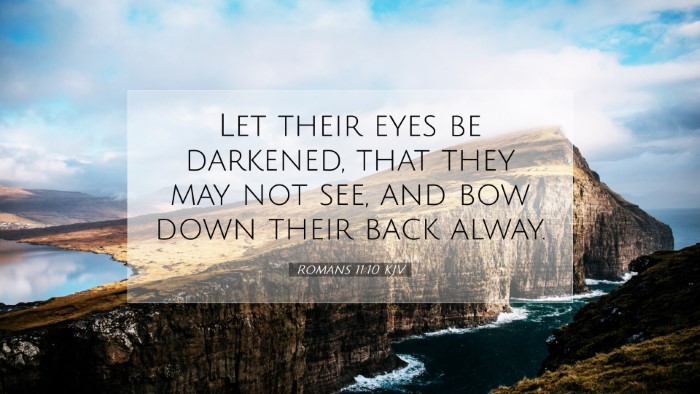Commentary on Romans 11:10
Romans 11:10 states, "Let their eyes be darkened, that they may not see, and bow down their back alway." This verse is a part of the Apostle Paul's discussion regarding the state of Israel, their unbelief, and the consequences that ensue as a result of their rejection of the Gospel. It draws from both David's Psalms and Isaiah's prophecies, illustrating the severe repercussions of turning away from God.
Contextual Background
To fully grasp the implications of Romans 11:10, one must examine the larger context in which Paul is writing. Paul addresses the spiritual condition of the Jews who have largely rejected the message of Christ despite being God’s chosen people. This rejection not only brings individual consequences but also affects the entire nation of Israel.
Historical Setting
The early Christian church consisted predominantly of Gentiles who embraced the message of the Gospel, which Paul presents as a mystery revealed through Jesus Christ. In contrast, Israel, who had the Law and the Prophets, often stumbled over the very cornerstone, Jesus. This situation leads Paul to lament the spiritual blindness of his fellow countrymen and to reflect on the divine sovereignty at work within this rejection.
Theological Insights
Several critical themes emerge from Romans 11:10, particularly pertaining to divine justice and mercy. The quote from David highlights a profound truth about the consequences of persistent unbelief.
- Divine Judgment: The expression of allowing their eyes to be darkened indicates a judicial hardening by God in response to their rejection of truth. This echoes the theme found in other parts of Scripture where hardening is a result of human obstinacy towards divine revelation (Exodus 10:1).
- Spiritual Blindness: The blindness depicted here is not something that simply happens; it is a poignant reality for those who continuously reject God’s revelation. Matthew Henry notes that this is a fulfillment of prophecy which serves both as a warning and a reality check for the church regarding spiritual heedlessness.
- Hope for Redemption: Even within judgment, there exists the notion of hope. Paul carefully delineates that God has not completely rejected His people, as seen in the remnant who are within the church. Adam Clarke emphasizes that while there are consequences for sin, God's grace abounds for those who seek Him earnestly.
Comparative Commentary
Examining commentary from Matthew Henry, Albert Barnes, and Adam Clarke reveals deeper layers to this verse:
Matthew Henry’s Perspective
Matthew Henry comments on this verse by pointing out the severity of the condition of Israel. He emphasizes that their blindness is a consequence of their own choices, aligning with the theological principle of free will. Henry reflects on how “to be made blind to spiritual things is the curse of the wicked,” suggesting that rejection leads to further alienation from God.
Albert Barnes’ Analysis
Albert Barnes provides a more pastoral approach, drawing attention to the implications of spiritual blindness in believers’ lives. He notes that when individuals turn away from God, they invite a foreboding darkness that stifles their ability to perceive truth. Barnes calls readers to introspectively evaluate their hearts and the condition of their spiritual vision.
Adam Clarke’s Insight
Adam Clarke focuses on the necessity of God’s grace to overcome such blindness. Clarke indicates that God’s mercy is indeed paramount, and the darkening of eyes serves as a severe warning of the importance of heeding divine instruction. He articulates the balance between God’s justice in allowing blindness and His mercy in granting sight to those who humble themselves.
Implications for Contemporary Readers
Modern pastors, students, and theologians can draw several vital lessons from Romans 11:10:
- Recognition of God’s Sovereignty: Every believer is called to acknowledge God’s supreme authority and the reality that rejection of His ways can lead to profound consequences. This serves as a reminder of the importance of living a life submitted to His will.
- The Importance of Spiritual Vigilance: Believers must remain vigilant, ensuring that they do not become complacent or desensitized to the Holy Spirit's guiding. As Paul emphasized, the state of one’s spiritual eyesight can fluctuate based on attitudes and actions towards God.
- Hope and Redemption in Christ: Despite the severity of spiritual blindness, the message of the Gospel remains one of grace and redemption. The church is called to extend hope to those still in darkness, showcasing Christ as the light that dispels spiritual blindness.
Conclusion
Romans 11:10 serves as a cautionary tale within the broader narrative of the New Testament's proclamation of salvation. As pastors, scholars, and students engage with this text, it is crucial to understand the balance of God's justice, the dire outcomes of rejecting His truth, the profound need for human responsiveness, and the immeasurable grace available through Jesus Christ. The implications of spiritual blindness challenge the church to remain active in fostering a relationship with God that ensures they are walking in His light, fulfilling the directive to hold fast to the truth while reaching out to those who are lost.


